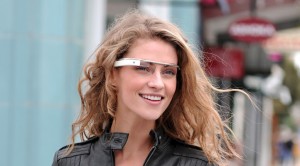
So, what is this Glass thing anyway and why would you want to have it? Well, Google Glass is like the rim of a pair of glasses that is supported by your nose and ears. But that is where the traditional part stops. Google Glass has a camera and a small screen that allows you to access information from the internet or share pictures.
It is easy to dismiss Google Glass as something that is intrusive and that will never be used by lots of people in real life. However, that would be short selling the technology at hand. It might just be that Google Glass is the next big thing after the invention of the mobile phone. Yes, I skipped tablets and smartphones altogether. The thing is that the impact Google Glass can have on society is much bigger than we imagine. And I am not moving towards privacy issues or being out of tune with reality. After experiencing Google Glass, the change might be in a completely different place.
Over the past years, a lot of people have been talking about augmented reality. This is where information is added from online sources to compliment the world around you. Google Glass allows you to add information from online sources as you go about your life. The good part is that, even though the person across from you might think you look strange, Google Glass will not actually be in your eye-sight. It will be slightly out to the top right of it. This allows you to look anyone straight in the eye, even though you might be getting extra information. How about using that possibility instead of fumbling with your papers at your next presentation or sermon? Or how about getting that information to help you navigate through a town without having to look at your phone and subsequently missing a step in the road.
These are just practical solutions that are in existence at the moment. But I strongly believe more will come. Wearable electronics will become bigger in the coming five years. We will also see more solutions that will add extra information to everyday life as we move around. The interesting question comes when we ask ourselves, so how can we use this?
Last week a surgeon used Google Glass in the operating room to share with others what he was doing. How can we apply this to the way in which we are church within our community? Would it help our personal lives to project scriptures at certain places in the city? Can it do more for ministers than showing their sermon notes? Or can the possibility of Google Glass give a whole new meaning to discipleship and walking together? I believe we are at the start of this new technology, but I think that in 10 years our children might find it strange that there was a time when it did not exist.
Update: A couple of hours after we published this blogpost, Google released an update for Google Glass now allowing the owners to launch a webbrowser, to access their full address book from Gmail, and to use more voice commands.


augustus 28, 2013 @ 11:45 pm
Arne, have you used Glass yet? I have been wearing my pair to a few church functions. In some ways it is just as distracting as you would imagine. At the same time, though, people often forget I’m wearing them after just a few minutes.
augustus 29, 2013 @ 8:46 am
Hey Marcus, I have tried them but I do not own a pair. Not being based in the States makes it more challenging to get them. But I do believe you. After all, people forget someone wears glasses until they buy a new pair. And even then some don’t see that. So, that is why I believe it can be a great addition to pastors/preachers/speakers. After all, it allows you to make contact with your audience more than when you are using notes or screens to keep track of your presentation.